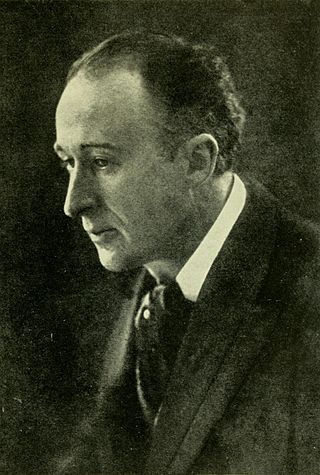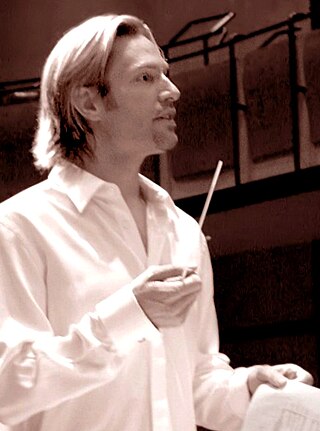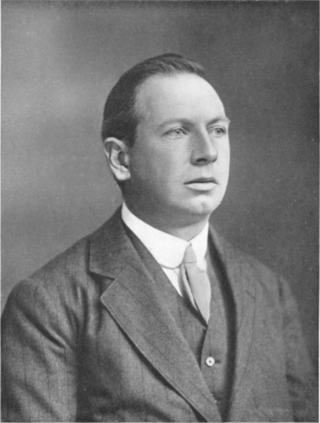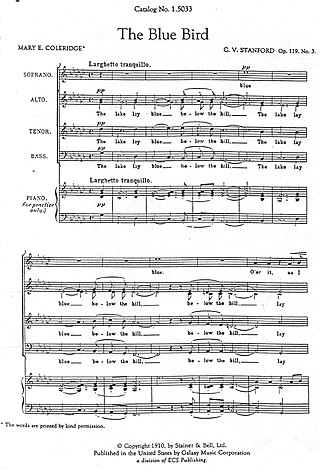
Frederick Theodore Albert Delius was an English composer. Born in Bradford in the north of England to a prosperous mercantile family, he resisted attempts to recruit him to commerce. He was sent to Florida in the United States in 1884 to manage an orange plantation. He soon neglected his managerial duties, and in 1886 returned to Europe.

Eric Edward Whitacre is a Grammy-winning American composer, conductor, and speaker best known for his choral music.
The BBC Symphony Chorus is a British amateur chorus based in London. It is the dedicated chorus for the BBC Symphony Orchestra, though it performs with other national and international orchestras.

Henry Balfour Gardiner was a British musician, composer, and teacher.
A Song of the High Hills is a work for tenor, soprano, chorus and orchestra by Frederick Delius. Composed in 1911, it was first performed under the direction of Albert Coates, at the Queen's Hall in London on February 26, 1920. That was a concert of the Royal Philharmonic Society with soloists Maud Willby and Norman Stone, with the newly formed Philharmonic Choir under the direction of its founder Charles Kennedy Scott making its first public appearance. The piece is symphonic, and uses the chorus mainly as a wordless background. Delius explained that
I have tried to express the joy and rapture felt in the High Mountains and to depict the lonely melancholy of the highest altitudes of the wide expanses. The vocal parts typify Man in Nature.
A part song, part-song or partsong is a form of choral music that consists of a song to a secular or non-liturgical sacred text, written or arranged for several vocal parts. Part songs are commonly sung by an SATB choir, but sometimes for an all-male or all-female ensemble. Part songs are intended to be sung a cappella, that is without accompaniment, unless an instrumental accompaniment is particularly specified.

Frederic William Austin was an English baritone singer, a musical teacher and composer in the period 1905–30. He is perhaps best remembered for his arrangement of Johann Pepusch's music for a 1920 production of The Beggar's Opera by John Gay, and its sequel Polly in 1922; and for his popularization of the melody of the carol The Twelve Days of Christmas. Austin was the older brother of the composer Ernest Austin (1874–1947).
Sea Drift is among the larger-scale musical works by the composer Frederick Delius. Completed in 1903–04 and first performed in 1906, it is a setting for baritone, chorus and orchestra of words by Walt Whitman.
Paul Spicer is an English composer, conductor, and organist. He taught choral conducting at the Royal College of Music and conducted the RCM Chamber Choir between 1995 and 2008. Until his retirement in July 2022 he also taught at the Royal Birmingham Conservatoire and conducted their chamber choir which records for Somm Records. He also teaches at Oxford and Durham universities. Since 2004 he has been the conductor of the Petersfield Festival. He was Senior Producer for BBC Radio 3 for the Midlands Region based in Birmingham between 1984 and 1990 after which he moved to be artistic director of the Lichfield Festival. He also produced for various record companies over many years. He founded the Finzi Singers in 1984 making many recordings for Chandos Records. He conducts the Birmingham Bach Choir and the Whitehall Choir in London. His compositions include two oratorios for Easter and for Advent with libretti by the Dr Tom Wright and a choral symphony 'Unfinished Remembering' (2014) to a libretto by Euan Tait commemorating the outbreak of World War 1. He runs a series of choral courses under the banner of The English Choral Experience based mainly at Abbey Dore in Herefordshire.

Charles James Kennedy Osborne Scott was an English organist and choral conductor who played an important part in developing the performance of choral and polyphonic music in England, especially of early and modern English music.

The Reger-Chor is a German-Belgian choir. It was founded in Wiesbaden in 1985 and has been conducted by Gabriel Dessauer in Wiesbaden. Since 2001 it has grown to Regerchor-International in a collaboration with the organist Ignace Michiels of the St. Salvator's Cathedral of Bruges. The choir performs an annual concert both in Germany and Belgium of mostly sacred choral music for choir and organ. Concerts have taken place regularly in St. Bonifatius, Wiesbaden, and in the cathedral of Bruges in its series "Kathedraalconcerten". The choir performed additional concerts at other churches of the two countries and in the Concertgebouw of Bruges.
A Mass of Life is a cantata by English composer Frederick Delius, based on the German text of Friedrich Nietzsche's philosophical novel Thus Spoke Zarathustra (1883-1885). In 1898, Delius had written a male choir and orchestral setting of "Midnight Song" from the same work, and this was revised to form part of the Mass.

The English Chamber Choir is a choir based in England.
Songs of Sunset is a work by Frederick Delius, written in 1906–07, and scored for mezzo-soprano and baritone soli, SATB chorus and large orchestra. The words are by Ernest Dowson.
A Boy Was Born, Op. 3, is a choral composition by Benjamin Britten. Subtitled Choral variations for men's, women's and boys' voices, unaccompanied , it was originally composed from 1932 to 1933. It was first performed on 23 February 1934 as a BBC broadcast. Britten revised the work in 1955. The composer set different texts related to Christmas to music as theme and variations, scored for an a cappella choir with boys' voices.
This is a summary of 1917 in music in the United Kingdom.

The Blue Bird is a partsong composed by Charles Villiers Stanford in 1910. It is set to the words of L'Oiseau Bleu, a poem by Mary Elizabeth Coleridge, which depicts a bluebird in flight over a lake. It is written for soprano, divided altos, tenor and bass. "The Blue Bird" is the third of Stanford's Eight Part Songs which are all settings of texts by Coleridge. It was widely performed by choral societies in England during Stanford's life and is considered one of the best English partsongs ever written. It has been recorded by ensembles including The Cambridge Singers, Oxford Camerata, Tenebrae, and the Gabrieli Consort.

"This Have I Done for My True Love", or "Tomorrow Shall Be My Dancing Day", Op. 34, no. 1 [H128], is a motet or part song composed in 1916 by Gustav Holst. The words are taken from an ancient carol, and the music is so strongly influenced by English folk music that it has sometimes been mistaken for a traditional folk song itself. It has often been described as a small masterpiece.

Benjamin Britten's Five Flower Songs, Op. 47, is a set of five part songs to poems in English by four authors which mention flowers, composed for four voices (SATB) in 1950 as a gift for the 25th wedding anniversary of Leonard and Dorothy Elmhirst. It was first performed in the open air at the couple's estate Dartington Hall, with Imogen Holst conducting a student choir. The set has been frequently recorded by English and foreign chamber choirs and ensembles, including Polyphony, Cambridge Singers and the RIAS Kammerchor.










